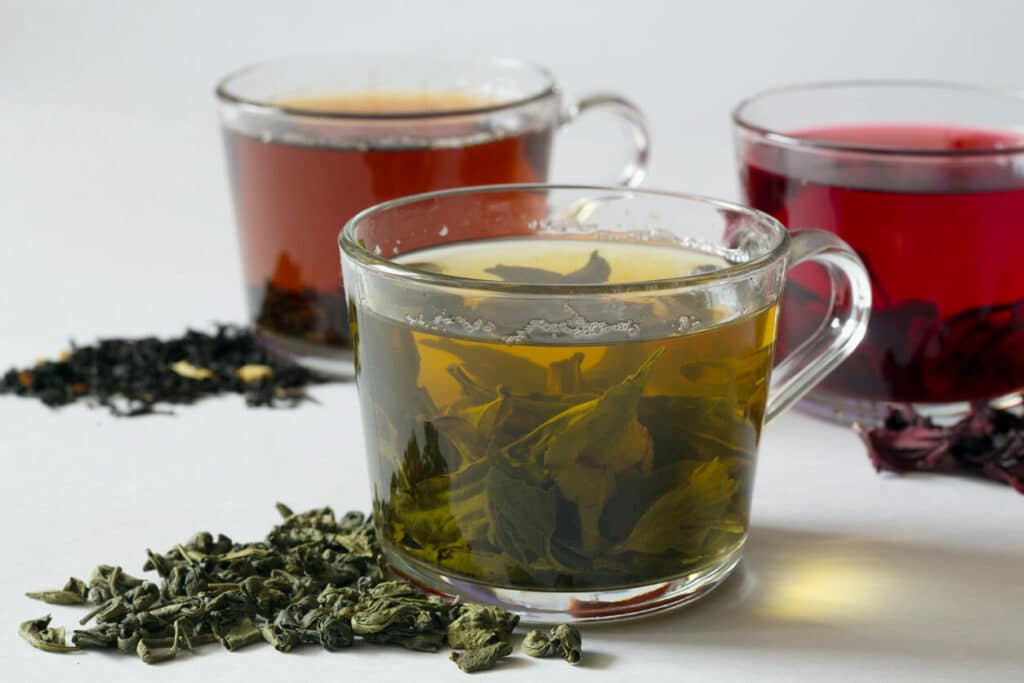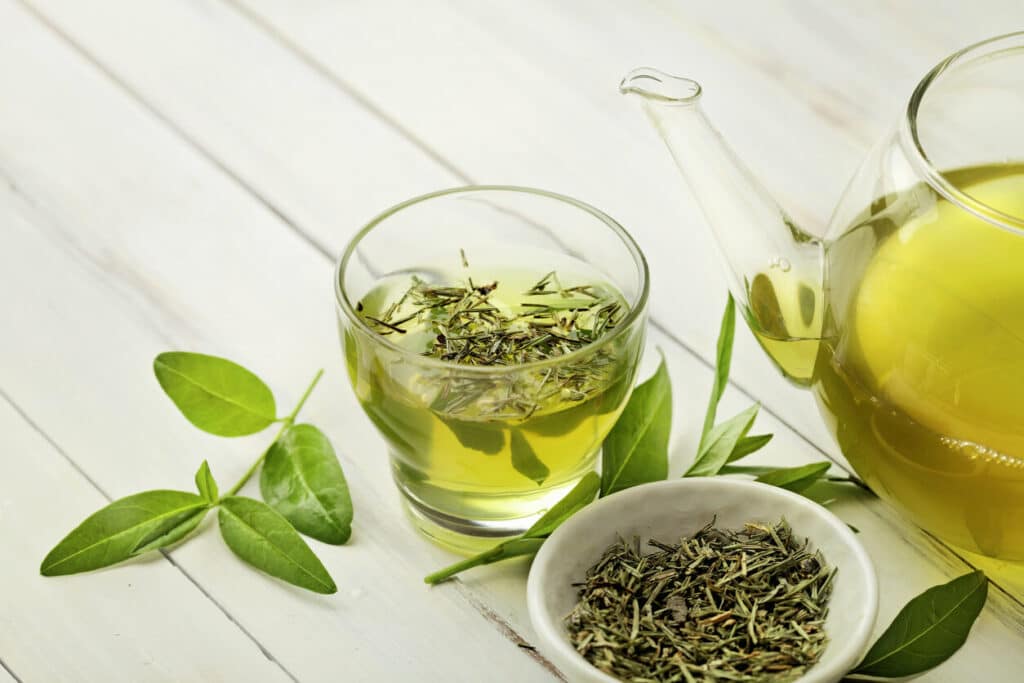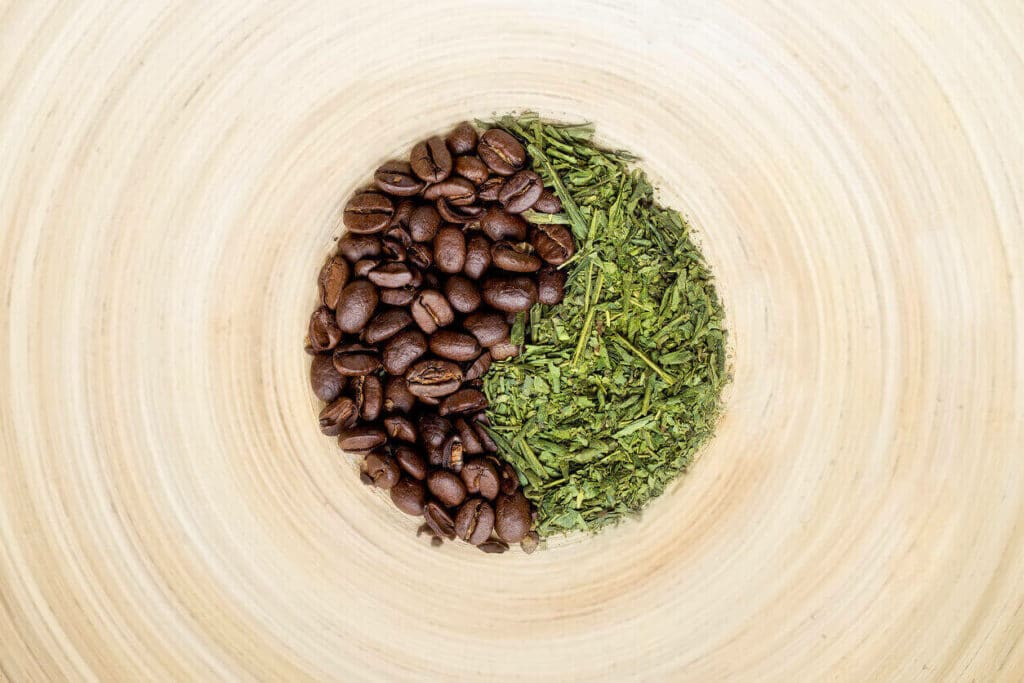Black Tea vs Green Tea: A Comparison

This detailed guide will discuss the key differences between black tea vs green tea, from taste to caffeine levels and health benefits, and much more!
If you're a tea lover, you know that black and green teas are similar in terms of components and benefits. After all, they come from the same plant - Camellia sinensis.
For instance, they both contain antioxidants and caffeine, which help boost brain function (1). Because of this, many people working towards fitness, weight loss, or wanting to live a healthy lifestyle, typically favor these two.
Despite their similarities, there are significant differences between black and green teas. The more obvious ones are their color and taste. But there is more to it than that.
This article will deep-dive into everything you need to know about green tea vs black tea, how they differ from each other, and what benefits you can get from them, which will lead us to answer which is healthier, black tea or green tea?
What is Black Tea?
Black tea is a product of Camellia sinensis, the tea plant. Before being processed and dried, black tea leaves are allowed to completely oxidize, turning them a deep brown color and giving the tea its distinctive flavor.

Due to its bold flavor and extended shelf life, black tea is the most popular tea in the West. Black tea is a broad category that includes several well-known kinds like Assam, Keemun, Darjeeling, English breakfast and Earl Grey.
Black tea is produced mainly in India, with significant amounts also coming from Sri Lanka and Africa. Black tea can be served either hot or cold.
Black tea is a widely popular choice for a morning pick-me-up due to its high caffeine content. Its leaves undergo full fermentation, resulting in a bold and robust flavor. Whether you prefer a classic blend or a more intricate flavor, black tea offers a diverse range of options for all tea lovers, catering to every palate.
What is Green Tea?
Like all other non-herbal teas, green tea is produced from the leaves of the Camellia sinensis plant.

Green tea is less processed than black and oolong tea since it is developed using a steam-dry technique. Like black tea, there are different types of green tea from different regions across the world.
For example, Chinese green teas include Dragonwell and Gunpowder green tea, whereas Japanese green teas include Sencha and Bancha.
Green teas are exceptionally high in minerals and antioxidants due to their careful processing methods, which may have several positive health effects (2).
Green tea, as a beverage or nutritional supplement, is marketed to enhance mental clarity, ease headaches and gastrointestinal complaints, promote deep sleep (3), and encourage weight loss. Epigallocatechin-3-gallate (EGCG), a compound found in green tea, has been researched for its potential to prevent cancer and heart disease (2).
Black Tea vs Green Tea: What Are the Differences?
Taste and Color
Black and green tea can be distinguished visually from one another. Typically, black teas have a darker appearance and produce a reddish to copper-colored brew.
On the other hand, green teas generally are lighter in color and more delicate. Their brews can have a golden color or a deep vibrant green hue.
In terms of taste, black tea typically has a bold flavor with hints of fruit, honey, and spice when brewed. On the other hand, Green teas can have vegetal, nutty or marine undertones and a light body.
How They Are Processed
Green tea leaves are heated immediately upon harvest by steaming or pan-firing to stop oxidation. Doing this prevents oxidation and helps keep the beautiful green hue.
On the other hand, black tea is left to oxidize once collected, and that is how its leaves get their brown and black leaves.
How They Are Prepared
Their preparation is another crucial distinction between black and green tea.
Boiling water should be used to brew black tea, and black tea is typically steeped for no more than 3 to 5 minutes.
Further, black tea can be cooked in a pot (as opposed to infusing it in a teapot) containing spices for a longer period. An example of this is Machala Chai which includes numerous other ingredients like dairy and spices.
In most cases, green tea is made using hot water (but not boiling) and is consumed plain.
Even lower temperatures (about 140 degrees Fahrenheit or 60 degree Celsius) may be necessary for some types of delicate Japanese green tea, such as shade-grown green teas like gyokuro, while steeping times of one to two minutes are typical.
Caffeine Levels
The amount of caffeine in each tea varies. Compared to green tea, black tea contains more caffeine. As per the FDA, a typical cup of black tea contains about 47 mg of caffeine whereas a typical cup of green tea contains 29 mg.
In other words, the caffeine content of green tea is approximately half that of black tea. However, some green teas, such as matcha, can be cultivated to have a higher caffeine content, and some specialty teas may have relatively low caffeine levels.
Green Tea vs Black Tea Health Benefits
The oxidation process that black tea goes through heightens and amplifies the flavor. On the other hand, green tea's production avoids oxidation and yields a lighter color variant. These oxidation processes made some people believe that it reduces some beneficial properties of both teas. However, this is not true, as both provide several benefits, and below are some of them.
Can Protect Heart Health
Drinking tea is advantageous for heart health. Both include polyphenols, a beneficial class of antioxidants. The amounts and types of flavonoids and antioxidants in the two vary. Antioxidants and flavonoids can improve heart health by preventing plaque buildup in blood vessels (3)(4).
Green and black teas are beneficial for lowering bad cholesterol and blood pressure. Additionally, studies have demonstrated a decreased risk of heart attack and stroke in people who consume one to three cups daily. The risk of heart disease also proved to lessen among regular tea users (3)(4).
Can Enhance Brain Activity
Tea offers the advantage of the amino acid L-theanine in addition to having caffeine similar to that found in coffee.
By bridging the blood-brain barrier and inducing the release of the beneficial GABA neurotransmitter, L-theanine aids in the processes of a concentrated yet relaxed mentality.
Many believe that this amino acid, which helps to lower mood-enhancing serotonin and dopamine, is the key to balancing all unfavorable jittery, or anxious effects of coffee (3)(4).
Great Alternatives to Coffee
A cup of coffee in the morning is a terrific way to start the day.

However, it may be beneficial to drink tea instead for those who drink coffee and experience unwelcome unrest. Here are a few morning tea selections for you to try!
Green and black tea contain less caffeine than coffee and won't cause jitters or restlessness like a hot cup of joe.
Caffeine stimulates your neurological system that interferes with neurotransmitter inhibitors like adenosine. The two mood-enhancing transmitters, serotonin and dopamine, are released in the body when one consumes caffeine.
The positive mental effects of caffeine can improve focus, short-term memory, and mood.
Health Benefits Specific Green Tea
It is well known that drinking green tea results in a variety of health advantages while being comparable to black tea. Green tea generally has higher levels of L-theanine and antioxidants. It has a little less caffeine, which might benefit people sensitive to the stimulant.
EGCG Antioxidant
Generally, green tea provides a wider variety of antioxidants than black tea. The antioxidant EGCG is the most impressive.
It has shown promising health benefits in numerous test tube experiments. Studies on EGCG have revealed that it may destroy cancer cells while also slowing their growth. Additionally, it safeguards the liver and lessens the negative consequences of Alzheimer's. EGCG has relaxing, anti-microbial, and anti-fatigue benefits outside of all these trials (3)(4).
Health Benefits Specific to Black Tea
Unlike green tea, black tea has a solid flavor and a deeper color. Both types of tea are good for your health, but black tea has several advantages that green tea lacks.
One of them is the oxidation process in black tea releases theaflavins, potent antioxidants. Black teas are the only ones that contain theaflavins because green tea is not oxidized.
Theaflavins
Theaflavins have an extensive spectrum of antioxidant protective qualities.
They aid in fat cells' defense against free radicals. The potent polyphenol can also help the body in producing its natural antioxidants. According to studies, theaflavins' anti-inflammatory effects caused a decrease in the production of blood vessel plaque. Black tea has remarkable health advantages, with studies demonstrating a considerable drop in cholesterol and blood sugar. The variety may also encourage the breakdown of fat cells to manage weight (1).
So, Which Is Healthier: Black or Green Tea?
Both green tea and black tea contain potent compounds that have several health advantages.
They both aid in weight loss, heart health promotion, and immune system maintenance. Your unique situation and preferences will determine which one suits you the best.
While some drinkers favor black tea, others are committed to green tea drinkers. But if you're searching for a caffeine boost, black tea can be a decent option. On the other hand, green tea, which contains the relaxing amino acid L theanine, is a good option if your body is sensitive to caffeine.
In the end, it really boils down to taste and desire. Whether you drink green or black tea, you will get lots of health benefits!
People Also Read:
Frequently Asked Questions
Can you drink green tea every day?
Yes, because it contains compounds that are good for your health. Green tea can aid in weight loss and lower your risk of developing many illnesses, including diabetes, heart disease, and cancer. You should consume three to five cups of green tea daily for the most significant health advantages (5).
Does black tea increase blood pressure?
Black tea contains caffeine, which may raise blood pressure in those with high blood pressure. However, those who routinely consume black tea or caffeinated beverages don't appear to experience this (6).
Who is not allowed to consume black tea?
Drinking black tea can increase the amount of calcium excreted in the urine, which can help prevent brittle bones (osteoporosis). Black tea could make bones brittle. Don't drink more than three cups of black tea daily if you have osteoporosis (7). Finally, if you are pregnant or are sensitive to caffeine, avoid tea.
Bottom Line
There is a vast difference between black and green tea, from its processes to its preparation. Black teas are left to oxidize, resulting in brown and black leaves, while green teas are heated immediately to stop oxidation, keeping their beautiful green hue. Regarding caffeine levels, green tea contains half that of black tea.
Despite their differences, black and green tea provide similar health advantages, especially for the brain and heart. Although green tea may have stronger antioxidants than black tea, the research does not clearly recommend one tea over the other. Both include the soothing amino acid L-theanine as well as the stimulant caffeine.
Related Reads:
This article is intended for informational purposes only. It is not meant to replace professional medical advice, treatment or diagnosis. Do not consume any type of coffee, tea or herbal infusion if you are allergic to it. The information in this article is not intended to treat serious medical conditions. Please seek professional medical advice before using home remedies
- https://www.healthline.com/nutrition/green-tea-vs-black-tea
- https://www.nccih.nih.gov/health/green-tea
- https://www.healthline.com/nutrition/green-tea-before-bed
- https://www.healthline.com/nutrition/top-10-evidence-based-health-benefits-of-green-tea
- https://www.healthline.com/nutrition/how-much-green-tea-per-day
- https://www.rxlist.com/black_tea/supplements.htm
- https://www.webmd.com/vitamins/ai/ingredientmono-997/black-tea